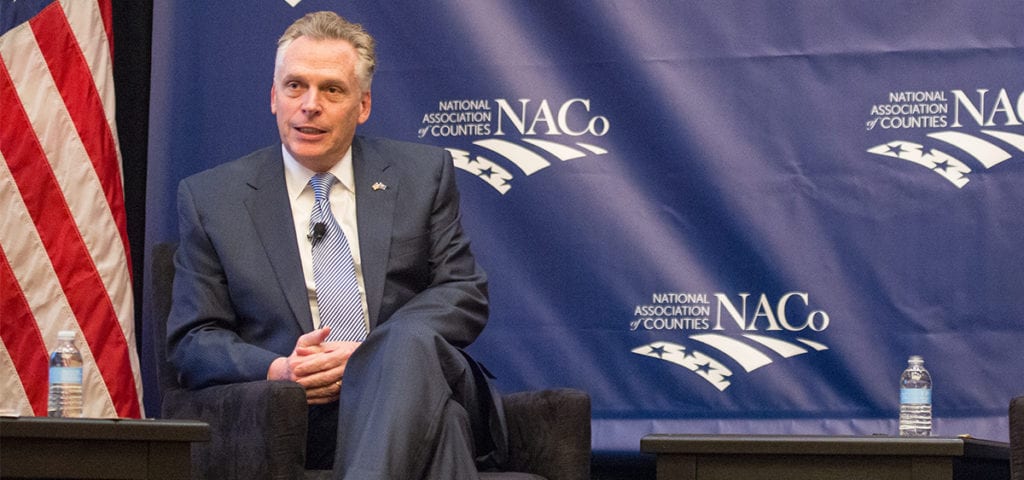The winner of the hotly-contested governor race in Virginia will shape the future of its regulated cannabis market.
Virginia Governor’s Race Offers Two Drastically Different Visions For Legalizing Cannabis

Terry McAuliffe, candidate for Virginia Governor's Race
Full story continued below.
Advertisement
This article was written by Gaspard Le Dem and originally published by Outlaw Report.
Terry McAuliffe cruised to the Democratic nomination for Virginia governor on Tuesday, setting the stage for what could be a close race between the former governor and Republican nominee Glenn Youngkin, a businessman with no prior political experience.
Polls show McAuliffe, an establishment candidate who is running for his old job—he was governor of Virginia from 2014-2018—is neck and neck with Youngkin. A darling of national Democrats, McAuliffe previously served as chairman of the Democratic National Committee and spearheaded presidential campaigns for the Clintons.
His opponent, a self-described political outsider, has never run for public office. But what Youngkin lacks in political experience he makes up for in money. The private equity executive, whose net worth is estimated at roughly $354 million, has used his personal wealth to flood Virginia’s airwaves with virulent attack ads against his rivals. Virginia Democrats meanwhile, call Youngkin, who was endorsed by former President Donald Trump and Senator Ted Cruz, a “pro-Trump extremist.”
By the time the winner of November’s general election is sworn-in it will be January and Virginia will have legalized cannabis possession, while a regulatory framework for recreational pot sales—which won’t begin until 2024—is still being hammered out.
While the commonwealth’s next governor will have limited power to affect cannabis legislation, advocates say a cannabis opponent could slow the state’s progress on legalization at a critical junction.
McAuliffe and Youngkin seem to have diametrically opposed views on cannabis issues.
Though McAuliffe initially opposed legalizing recreational pot, he eventually became an advocate for the cause and is now placing it at the forefront of his re-election agenda.
In a November opinion piece published in the Washington Post, he embraced legalization as a “civil rights” issue, calling for the expungement of prior cannabis convictions, eliminating cannabis-related barriers to employment, and prioritizing the participation of people harmed by The War on Drugs in the industry.
“There is no question marijuana needs to be legalized in Virginia,” McAuliffe wrote in the piece, which was co-authored by Don Scott, a fellow Democrat in Virginia’s House of Delegates. “But we do need to challenge ourselves to do what is right, not what is easy. If we want to finally implement real criminal justice reform, we have to be bold, and this is a great place to start.”
Jenn Michelle Pedini, Executive Director for the Virginia branch of NORML, a national cannabis advocacy group, told The Outlaw Report that McAuliffe’s willingness to change his stance on legalization is the mark of a pragmatic politician.
“I think that that’s just another natural evolution that happens with lawmakers who are focused on sound public policy, as opposed to partisan talking points,” Pedini said.
During his prior governorship, McAuliffe signed several cannabis bills, authorizing the drug’s use for patients with epilepsy, and easing driver’s license suspensions for people charged with cannabis offenses.
Youngkin, meanwhile, has shown little more than aversion for cannabis legalization. In May, he told CNBC that cannabis legalization is a “mess” that he would “clean up” as governor, though he didn’t offer specifics.
“[Cannabis legalization] is going to be another problem that’s going to be dumped at my feet,” Youngkin said. “And the reality is, if I had a group of kids here that were asking me about marijuana use, I would tell them don’t use it. The reality is that the industry that everyone used as the rationale for legalizing it, has not performed in other states. They’ve already predicated a bunch of spending on it and the reality is I’m going to have to deal with this when I’m governor.”
Pedini said Youngkin is clearly uninformed on cannabis issues: “He doesn’t appear to be very well-versed in the need for a cannabis policy that is both fair and just, and puts cannabis behind an age-verified counter so as to be best regulated for public and consumer safety.”
Many of Virginia’s laws around legalization aren’t yet finalized. The General Assembly still needs to reenact parts of the 2021 law concerning commercial sales and criminal penalties during next year’s legislative session. If Youngkin were to veto the reenactment of those laws, it could potentially complicate the launch of a regulated cannabis market.
“Essentially, that would be the option he would have, to use his veto power to attempt to stop progress,” Pedini said.
Advocates have urged officials to expedite the launch of a recreational cannabis market, pushing for sales to start earlier than 2024 in order to shorten the awkward time frame during which possession and growing will be legal, but buying and selling won’t be.
“Ensuring a safe, regulated marketplace that can best provide for public and consumer safety is one of the primary principles of legalization,” Pedini said. “And until the Commonwealth does so, despite legalizing possession of personal cultivation, Virginians not participating in the medical cannabis program will still be engaging in illicit activity to access marijuana.”
On Monday, a government watchdog group published a report urging Virginia lawmakers to modify the timeline for the launch of a recreational cannabis market. The Joint Legislative Audit and Review Commission suggested moving up the date by which sellers can start applying for state-issued licenses from its current date of July 1, 2023 to the start of that year.
Get daily news insights in your inbox. Subscribe
End